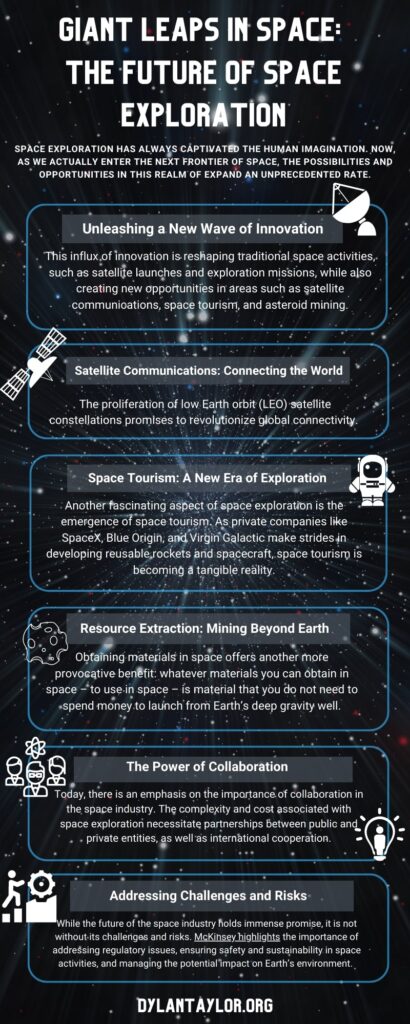Space exploration has always captivated the human imagination. Now, as we actually enter the next frontier of space, the possibilities and opportunities in this realm of expand an unprecedented rate. In a world where technological advancements rapidly reshape industries, space exploration offers a new frontier for innovation, scientific discovery, and commercial potential. In this article, we delve into the insights on the topic and explore the exciting prospects of the evolving space industry.
Unleashing a New Wave of Innovation
Research offers insights into the transformative impact that the space industry can have on various sectors of the economy. As private companies enter the space race, they bring disruptive technologies, entrepreneurial spirit, and fresh perspectives. This influx of innovation is reshaping traditional space activities, such as satellite launches and exploration missions, while also creating new opportunities in areas such as satellite communications, space tourism, and asteroid mining.
Satellite Communications: Connecting the World
One of the most significant developments in the space industry is the rapid growth of satellite communications. The proliferation of low Earth orbit (LEO) satellite constellations promises to revolutionize global connectivity. These constellations, consisting of hundreds (or soon thousands) of small satellites, can provide high-speed internet access to remote areas, bridge the digital divide, and enable innovative applications such as smart agriculture, autonomous vehicles, and telemedicine.
Space Tourism: A New Era of Exploration
Another fascinating aspect of space exploration is the emergence of space tourism. As private companies like SpaceX, Blue Origin, and Virgin Galactic make strides in developing reusable rockets and spacecraft, space tourism is becoming a tangible reality. Soon, individuals will have the opportunity to experience the awe-inspiring views of Earth from space and become part of a select group of spacefarers. This industry holds great potential for recreational travel, research collaborations, and scientific experiments conducted in microgravity.
Resource Extraction: Mining Beyond Earth
The prospect of resource extraction in space is an intriguing concept covered on by experts. As our reliance on Earth’s resources continues to grow, the ability to harness extraterrestrial resources becomes increasingly important. Asteroid mining, for example, could unlock vast reserves of valuable metals and minerals, providing a sustainable solution to resource scarcity on our planet. The extraction and utilization of space resources can revolutionize industries ranging from manufacturing and construction to energy production.
Obtaining materials in space offers another more provocative benefit: whatever materials you can obtain in space – to use in space – is material that you do not need to spend money to launch from Earth’s deep gravity well. As such, space mining can serve to propel the mining industry itself while enabling many space activities that would be improbable if they were to rely only on supplies from Earth.
The Power of Collaboration
Today, there is an emphasis on the importance of collaboration in the space industry. The complexity and cost associated with space exploration necessitate partnerships between public and private entities, as well as international cooperation. By pooling resources, knowledge, and capabilities, global collaboration can accelerate progress, mitigate risks, and maximize the benefits of space exploration. Collaborative efforts, such as the International Space Station and joint missions to Mars, demonstrate the power of working together towards common goals.
As international standards for space hardware have appeared – for payload interfaces and spacecraft docking standards – the ability for more players to establish and then change and re-establish relationships in space – as companies do on Earth – will only serve to enhance the growth of a robust space economy. International cooperative agreements such as the Artemis Accords also serve to establish norms of behavior and cooperation thus further enabling global collaboration and cooperation in space.
Addressing Challenges and Risks
While the future of the space industry holds immense promise, it is not without its challenges and risks. McKinsey highlights the importance of addressing regulatory issues, ensuring safety and sustainability in space activities, and managing the potential impact on Earth’s environment.
Additionally, as the industry becomes more competitive, fostering an environment that encourages innovation, entrepreneurship, and diversity in the space workforce is crucial.
There are many valuable insights to be made into the transformative potential of the space industry across various sectors. As we embark on the new normal, exploring space offers boundless opportunities for technological advancements, economic growth, and scientific breakthroughs. From satellite communications to space tourism and resource extraction, the evolving frontier of space promises a future that pushes the boundaries of human achievement. We can create a new world in space by embracing collaboration, addressing challenges, and utilizing technology and resources to their full potential.
In many ways the growth of the space sector – commercial, exploratory, and scientific – are proceeding in ways that are resource limited. Everything except sunlight has to be brought up from Earth. As additional ventures are developed between an ever-growing range of countries, companies, and universities continue, an emergent property – a true space economy – has begun to emerge. This is only the beginning.







